"I'm actually really glad that e-books came along," said Jane Streeter, owner of the Bookcase in Lowdham, England, during a panel discussion entitled "What Readers Want" at the Frankfurt Book Fair last Friday. The panel featured independent booksellers from the U.K., U.S. and Germany, who discussed recent trends and changes in the book business. Ariana Paliobagis, owner of Country Bookshelf in Bozeman, Mont., and Patrick Musial, an owner of Buchhandlung Musial in Recklinghausen, Germany, were also on the panel, and Shelf Awareness editor-in-chief John Mutter was the moderator.
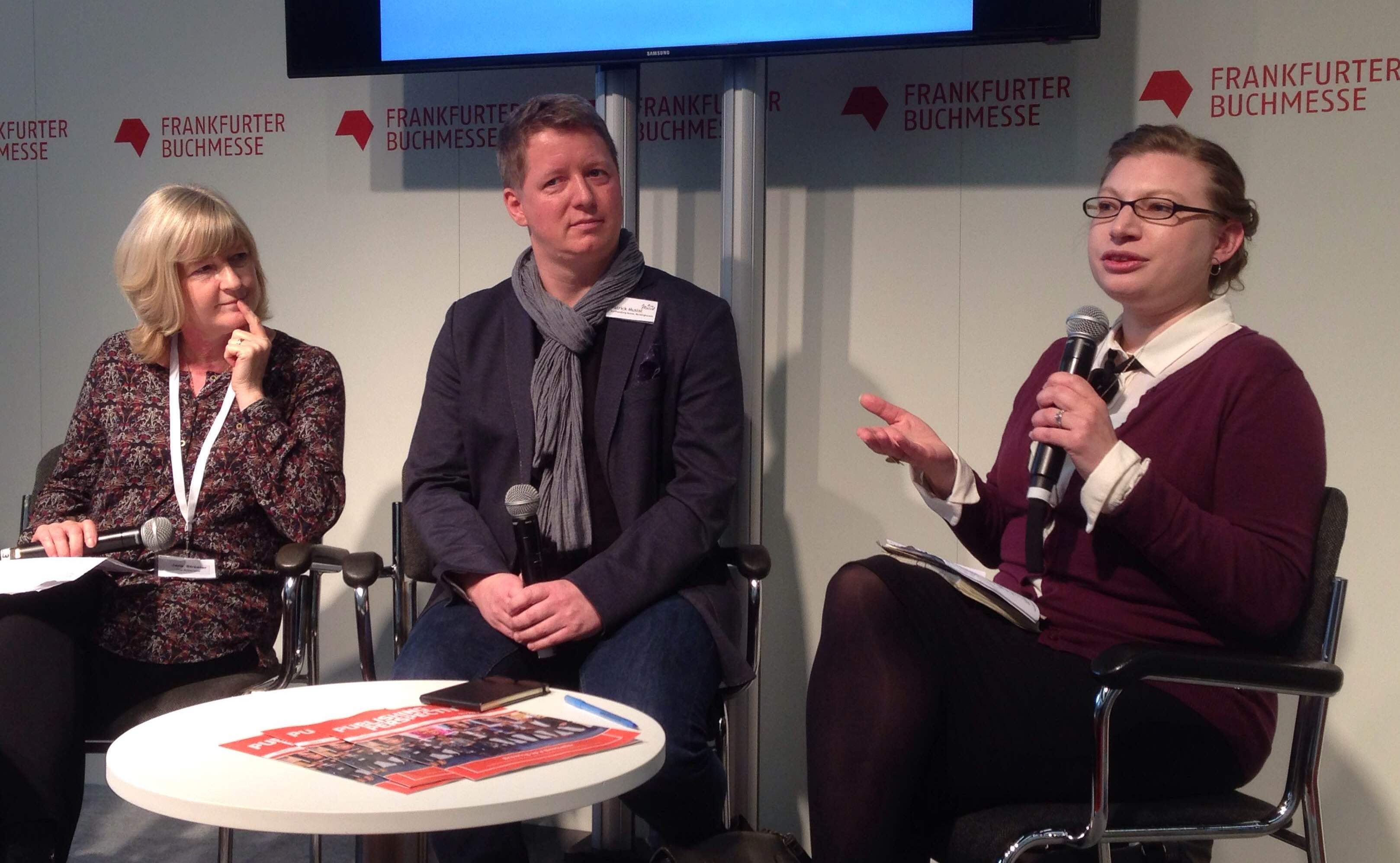 |
| l.-r.: Jane Streeter, Patrick Musial and Ariana Paliobagis |
"The most wonderful result of that is that the physical book is now a real object of desire," continued Streeter.
Streeter and Paliobagis, who won an Europa Editions scholarship that allowed her to attend the Book Fair, both reported that they've seen strong growth in their children's sections in recent years. When Paliobagis bought Country Bookshelf some six years ago, the kids' section took up maybe an eighth of the store. Now it is at least a quarter, if not more than that, and still growing.
"It's very welcoming for families," said Paliobagis. "We find that's good all around. The longer you keep families in there, the more likely they are to find something for everyone."
Musial said that although children's and young adult books are a big part of his business, he hasn't seen the same sort of growth that Paliobagis and Streeter have. Cookbooks and travel books, however, are doing extremely well, "despite all of the apps and smartphone use." Paliobagis noted that cookbooks, specifically the gorgeously made, less practical sort, are selling extremely well, as are science and nature books. Streeter, too, has seen a significant increase in nature writing, spurred in part by the Wainwright Prize, awarded annually for U.K. nature and travel writing. Paliobagis and Streeter both said that in their stores, coloring book sales are finally beginning to decline.
When asked if their customers want or read e-books, all three of the booksellers said they do offer e-books, but it is a small part of their business. Musial explained that what worries him about e-book use is the potential for piracy, not the death of print, and added that he does not believe German publishers are doing enough to combat piracy. For both Streeter and Paliobagis, there is the particular customer who travels frequently and buys many e-books but, otherwise, e-books are often left alone. At the same time, physical books have seemed to become more and more objects of art as people return to them.
"If a book is well crafted, it encourages people to buy it," said Musial. "Pricing is not an issue at our shop. People are willing to pay for a product."
"Bookshops have become more beautiful because of Amazon. I really believe that," said Streeter, when the panelists were asked how they distinguish themselves from online retailers. "There are so many personal interactions. We do more events, more curation... we do the physical things you can't do online."
Paliobagis, meanwhile, said it's personal service that sets her store apart. In her view, no algorithm can truly replicate what good booksellers do on a daily basis. She added: "Our store is staffed by people who love books, read books, cannot stop talking about books."
"I like competition. I like competition with Amazon as well. Our goal is to be the better alternative," said Musial. He acknowledged that Amazon has helped change his view on customer service in the book industry a little bit. "Amazon is thinking from the customer's perspective, and I had to learn that. I learned it from Amazon. I'm not afraid of Amazon. I think it is a problem for big chain stores, but not as much of a problem for our kinds of shops."
Musial concluded: "As a bookseller friend of mine said, we are the ones with smiles on our faces, not on cardboard boxes." --Alex Mutter
 Book Passage, which has stores in Corte Madera and San Francisco, Calif., is opening a third store, in Sausalito, that will have about 1,800 square feet of space and be slightly larger than the Book Passage in the San Francisco Ferry Building. Owners Elaine and Bill Petrocelli plan to have a soft opening in about a month and a grand opening early next year.
Book Passage, which has stores in Corte Madera and San Francisco, Calif., is opening a third store, in Sausalito, that will have about 1,800 square feet of space and be slightly larger than the Book Passage in the San Francisco Ferry Building. Owners Elaine and Bill Petrocelli plan to have a soft opening in about a month and a grand opening early next year.








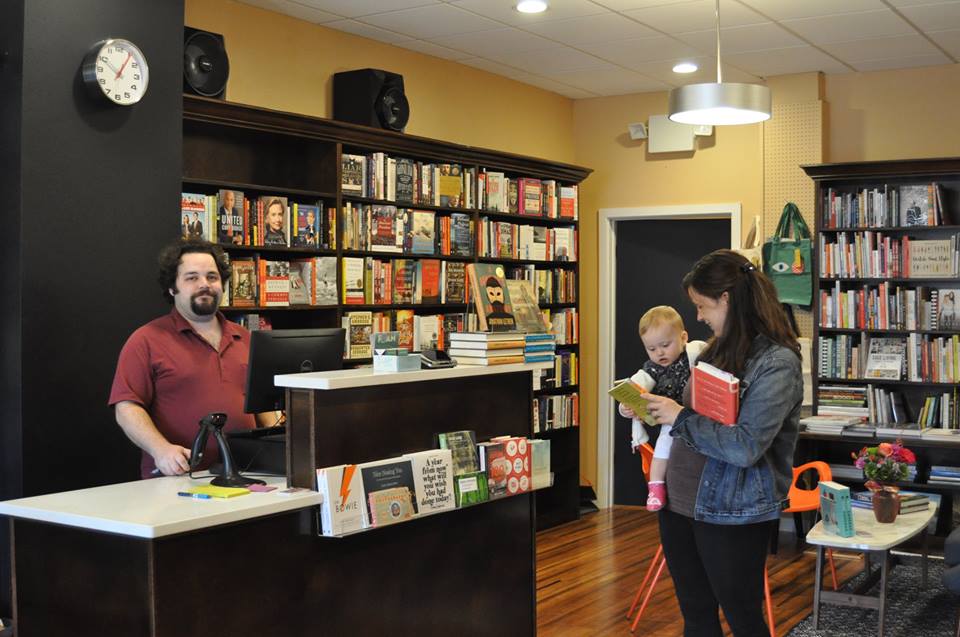 Narberth Bookshop
Narberth Bookshop
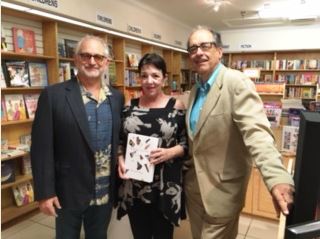 The
The 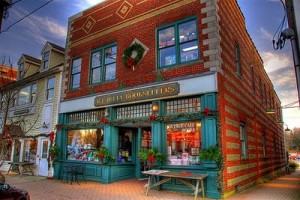 Noting that
Noting that  Art of Atari
Art of Atari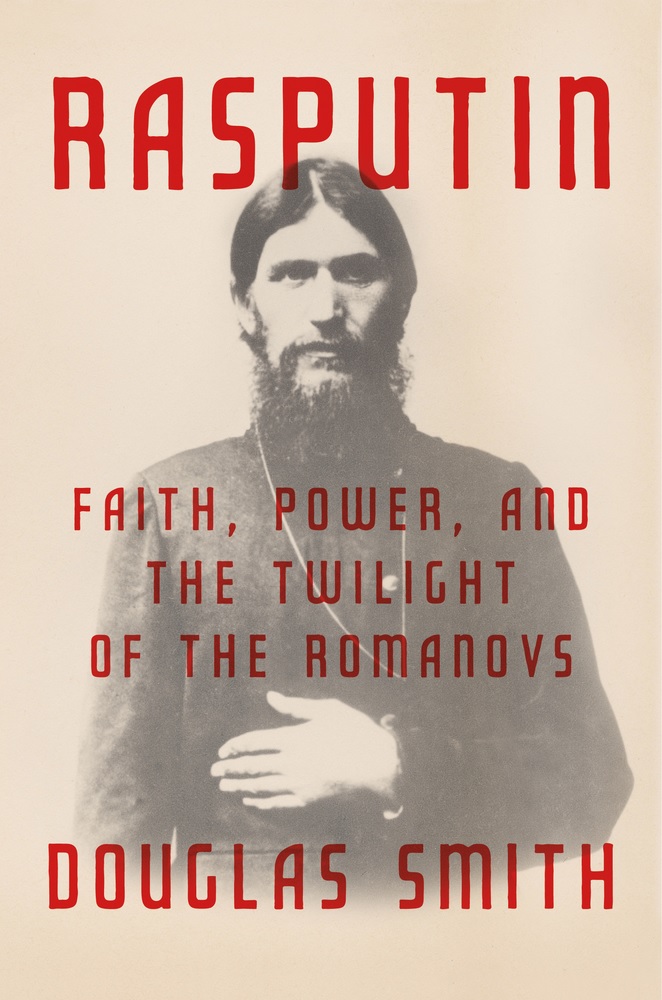 Douglas Smith's Rasputin: Faith, Power, and the Twilight of the Romanovs may seem like a daunting read. Weighing in at more than 800 pages and featuring a level of detail that brings to mind Robert Caro's accomplished doorstops, Rasputin is not just another in a long line of biographies of the so-called "holy devil." Smith, the author of Former People: The Final Days of the Russian Aristocracy, has written the definitive account of Grigory Rasputin's life and times, correcting more than a century's worth of disinformation and propaganda surrounding a humble peasant who became a near-mythic figure.
Douglas Smith's Rasputin: Faith, Power, and the Twilight of the Romanovs may seem like a daunting read. Weighing in at more than 800 pages and featuring a level of detail that brings to mind Robert Caro's accomplished doorstops, Rasputin is not just another in a long line of biographies of the so-called "holy devil." Smith, the author of Former People: The Final Days of the Russian Aristocracy, has written the definitive account of Grigory Rasputin's life and times, correcting more than a century's worth of disinformation and propaganda surrounding a humble peasant who became a near-mythic figure. 